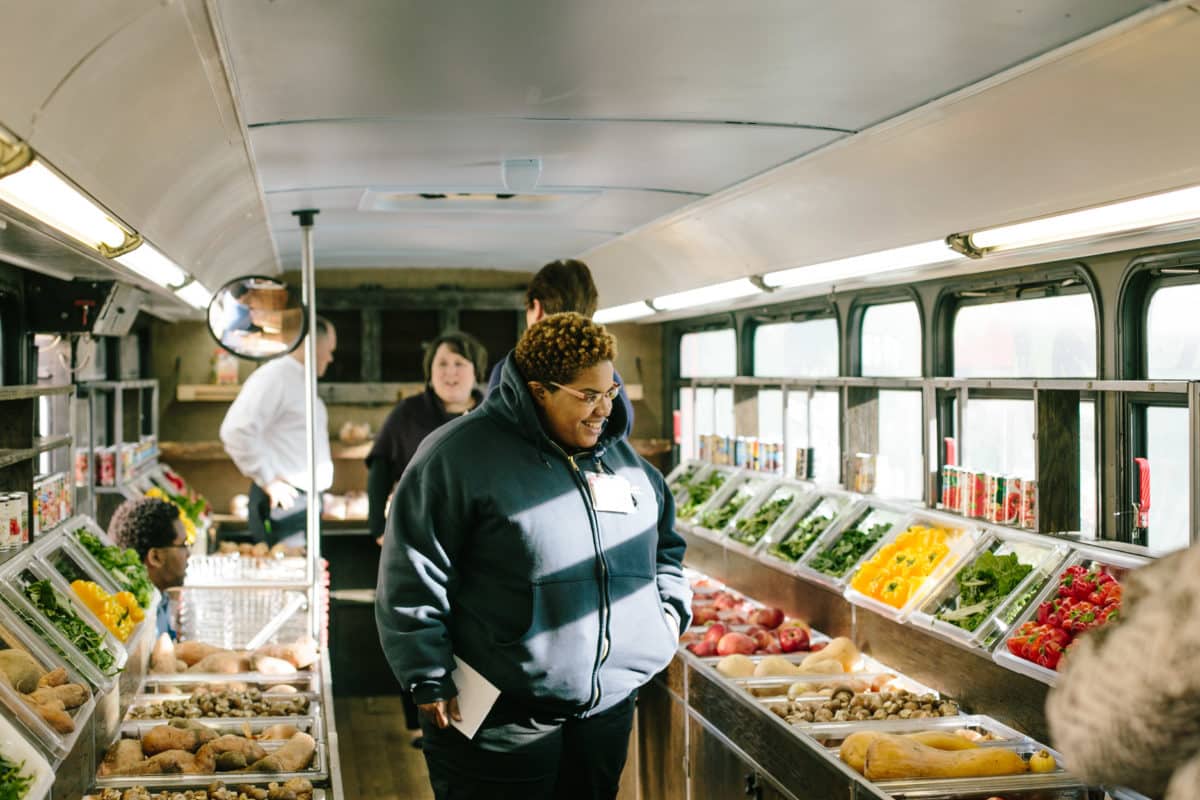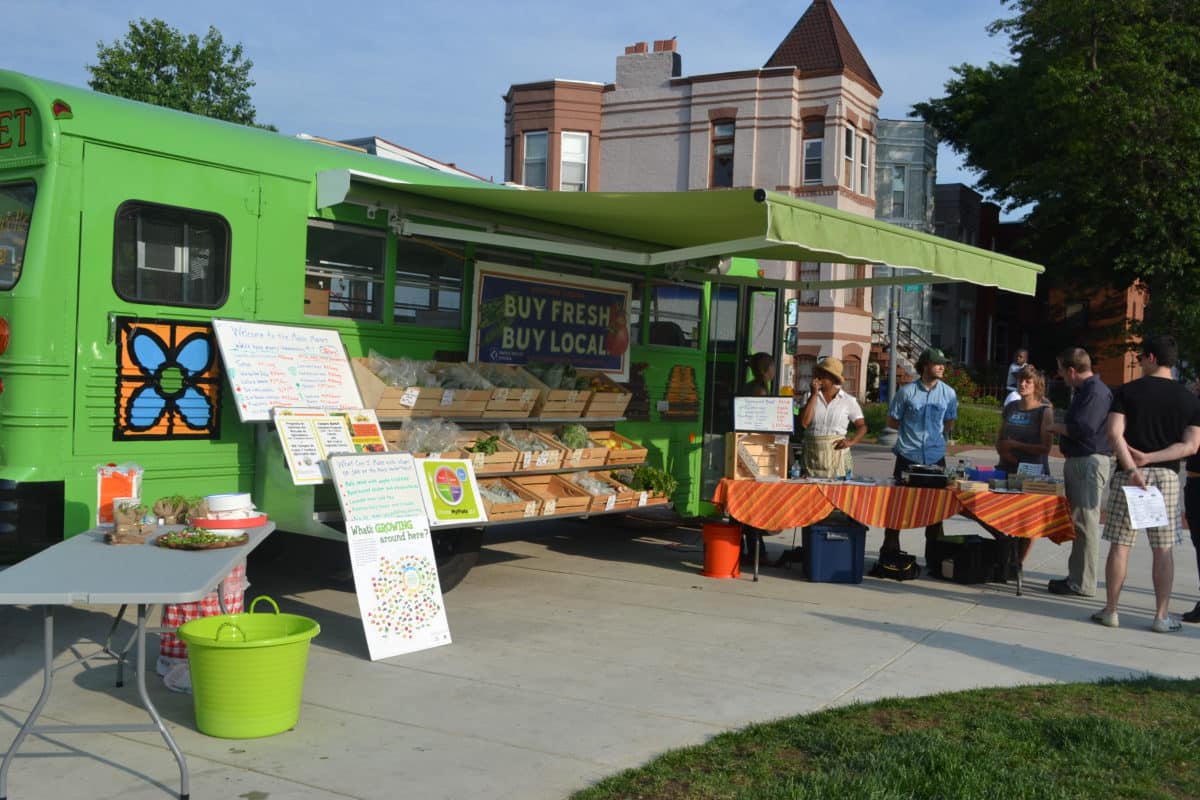From converted city buses festooned with colorful illustrations of parsnips, farmland and peppy slogans, to bicycles built to cart a mini farm stand, mobile farmers markets and grocery stores are getting fruits, vegetables, meats and pantry staples to places where fresh-from-the-farm items are hard to find. In these food deserts, primarily impoverished urban areas where it’s tough to find affordable, quality fresh food, traveling markets bring healthful foods to people who need it, but also have an opportunity to educate their customers and increase business for local farmers.
St. Louis MetroMarket, housed in a retired city bus, works with a local hospital where doctors give out “prescriptions” for produce in the form of a voucher which can then be used at the market for a specific dollar amount worth of fruits and vegetables. It also holds cooking demos to acquaint customers with unfamiliar items. Cities all over the country have taken on similar models, including D.C. Mobile Market in the Washington, D.C., area, which uses a converted school bus; and individual farms like Riverview Farms in Ranger, Georgia, which brings certified organic meats and vegetables to central Atlanta in its Farm Mobile bus. All take what used to be called “food stamps” — Electronic Benefit Transfer (EBT) or Supplemental Nutrition Assistance Program (SNAP) cards for payment.

While the primary goal of mobile markets is getting good food to underserved populations, seniors, or the homebound, many help subsidize their altruistic work by offering the market as an employee benefit at local corporations like Measured Progress, an educational assessment and services company. These companies pay for periodic visits, thus helping their busy employees have easy access to their wholesome food to take home to cook for dinner. In New Hampshire, Seacoast Area Mobile Market (SAMM) launched such a program this past summer.
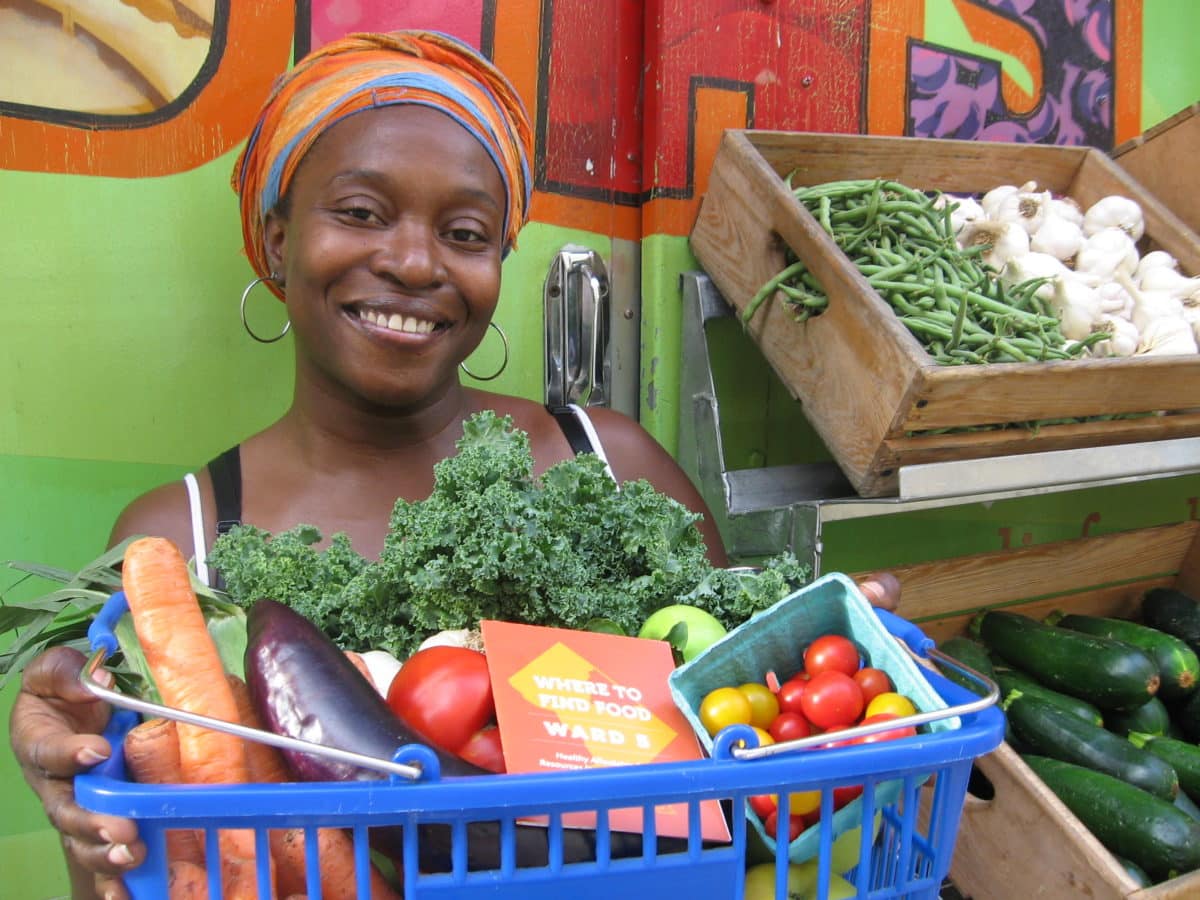
Jill Hall, Director of Programs for Seacoast Eat Local, a non-profit that connects people with sources of locally grown foods, worked with SAMM Coordinator Celeste Gingras to get the program running.
“It was an 8-week pilot this year so we’re still looking at the data, but the first great success is that we met our goals – we had three days of operation each week and covered the cost of purchasing products and gas for the vehicle.”
SAMM is funded in part by the New Hampshire Charitable Foundation, which helps connect philanthropic donations to community projects, and by Harvard Pilgrim Health Care Foundation’s Healthy Food Fund, dedicated to making fresh and local foods easily accessible and affordable for low- and middle-income families in New England.
Hall says they had specific criteria for choosing which spots in New Hampshire’s Rockingham and Strafford Counties the truck would go, including towns that didn’t have farmers markets of their own. She says they stop at places where public transportation isn’t strong and in the edges of towns where people tend not to leave the area, as well as school properties.
Hall, who was often on the truck, says they learned a lot from their first season.
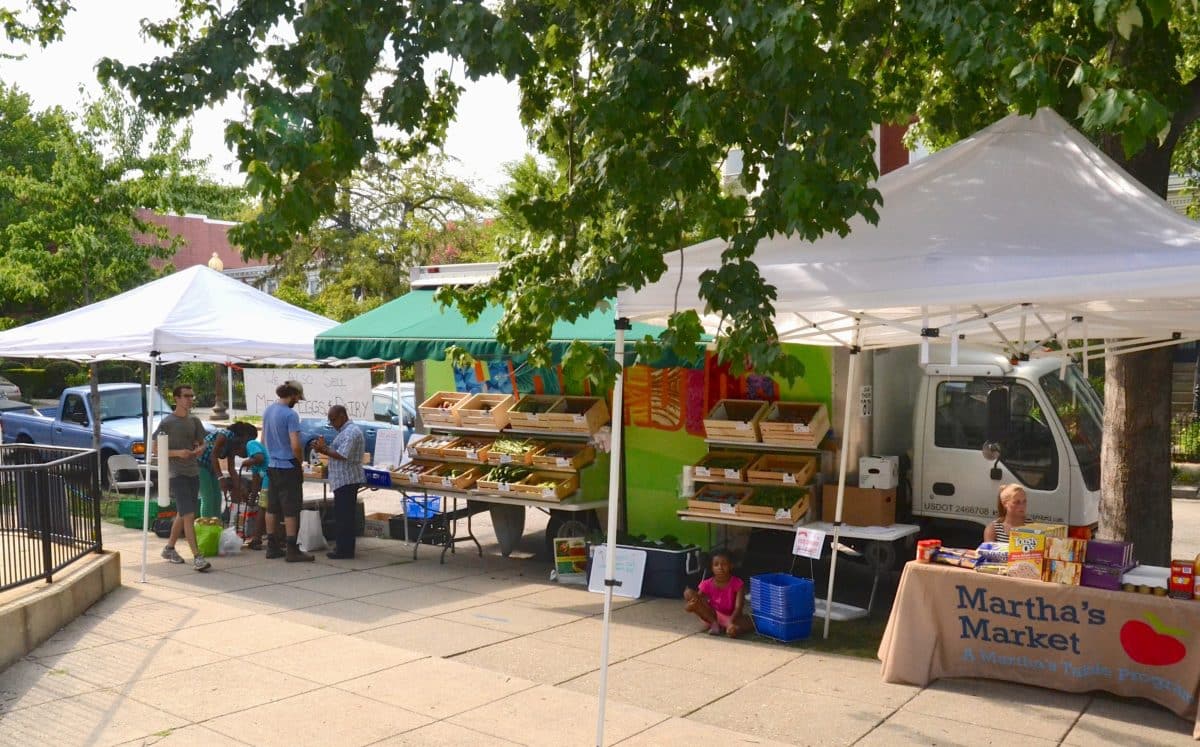
“Nobody likes pattypan squash,” she says. “Swiss chard was another. And for the senior residents, they liked cabbage but not a whole head, so we cut them in half. They wanted a half dozen eggs, too. We also heard from people that they wanted meats, so we’ll expand our refrigerated products next year with that as well as cheese and yogurt.”
SAMM also made stops at businesses as part of an employee benefit program.
“We had an arrangement with Measured Progress in Dover and we feel that part of the model is essential. We added a stop for the county employees in Dover, where there are all levels of employment.”
Education is also part of the model. Hall says that while pattypan squash wasn’t a hit, they brought in more eggplant — sometimes a more exotic Asian variety — and people became more accepting of it as eggplant. They also give recipe ideas.
Another aspect of the success of the mobile market is increasing the success of the small businesses that supply the market.
“We wanted to increase the strength of agricultural businesses by purchasing on a consistent basis. We’re seeing some really powerful relationships forming.”
While they do sometimes buy from larger farms, Hall says they’re building strong relationships with small farmers who might supply just one item, like garlic. “(At) one farm in Farmington, New Hampshire (we) buy her out of garlic,” Hall says. “It’s a scary responsibility to have her rely on us, but I’m proud we can be a good customer for her.”
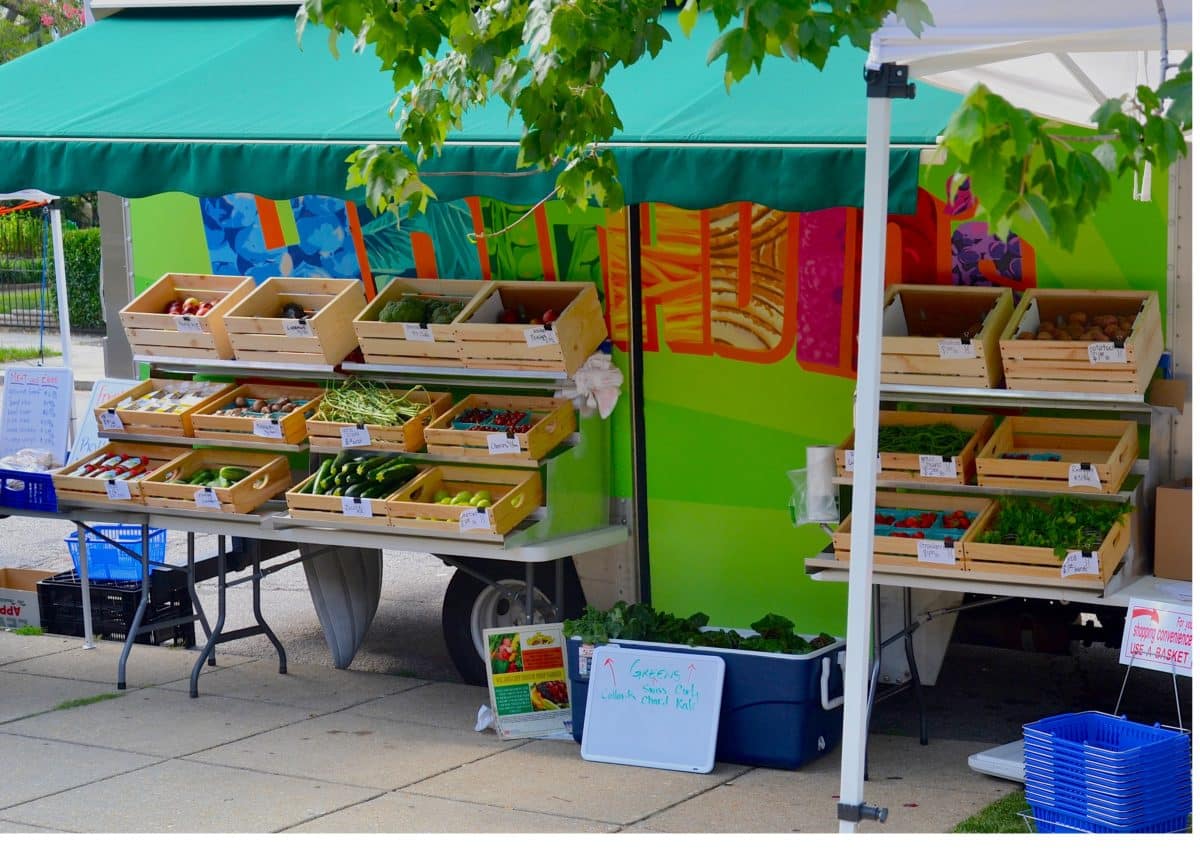
This is also the first year for Farmshare’s mobile market. The Austin, Texas based program launched in September 2016, and continues throughout the winter, thanks in part to a grant from the City of Austin. While the market supplies mostly produce to the community, they will offer some basic pantry and grocery items.
“We can supply the market from our seven acre farm but we’re also including staples like cooking oil,” says Farmshare Executive Director Taylor Cook. “We’re starting with five stops (that) we’ve identified as a food desert where there are no full service grocery stores.”
Cook says that while their farm is small, they also have a program called FarmerStarter that helps get student farmers training to manage a sustainable farming business; their farms will also help supply the truck.
“We’ll have a good mix of seasonal produce and the students will grow things people can use. They’ll also say, ‘well, here’s something you can do with this.’ We have recipe cards to hand out, too, from the Sustainable Food Center’s Happy Kitchen program. We supply affordable grocery products like canned beans, oils, whole wheat pasta, and rice, too, and try to be responsive to what our customers need.” ![]()
